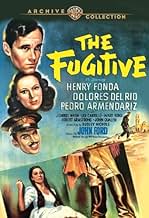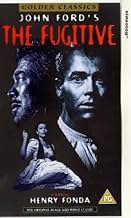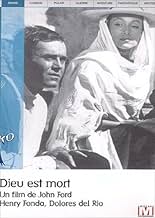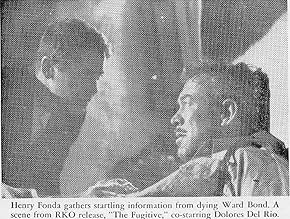IMDb रेटिंग
6.3/10
2.7 हज़ार
आपकी रेटिंग
अपनी भाषा में प्लॉट जोड़ेंAnti-Catholic and anti-cleric policies in the Mexican state of Tabasco lead the revolutionary government to persecute the state's last remaining priest.Anti-Catholic and anti-cleric policies in the Mexican state of Tabasco lead the revolutionary government to persecute the state's last remaining priest.Anti-Catholic and anti-cleric policies in the Mexican state of Tabasco lead the revolutionary government to persecute the state's last remaining priest.
- पुरस्कार
- 1 जीत और कुल 2 नामांकन
Dolores Del Río
- An Indian Woman
- (as Dolores Del Rio)
Pedro Armendáriz
- A Lieutenant of Police
- (as Pedro Armendariz)
Chris-Pin Martin
- An Organ-Grinder
- (as Cris-Pin Martin)
Miguel Inclán
- A Hostage
- (as Miguel Inclan)
Fernando Fernández
- A Singer
- (as Fernando Fernandez)
Rodolfo Acosta
- Policeman
- (बिना क्रेडिट के)
Mel Ferrer
- Father Serra
- (बिना क्रेडिट के)
Jack Pennick
- Man
- (बिना क्रेडिट के)
José Torvay
- Mexican
- (बिना क्रेडिट के)
कहानी
क्या आपको पता है
- गूफ़When the Priest is on line getting ready to board a ship, he is approached by a young boy that was baptized by him. The boy informs him that his mother is dying and wishes for the priest to come home with him to give her the last rites. What is not explained is how did the boy just happen to know that the priest was in town and getting ready to board a ship at that precise moment and in the third class section.
- भाव
A Lieutenant of Police: [Looking at news clipping] You can tell he's a priest by the collar, that's all.
A Chief of Police: Not a very good picture, but it's what we got.
A Lieutenant of Police: They all look alike to me. I've shot him a dozen times.
- साउंडट्रैकBury Me Not on the Lone Prairie
("The Dying Cowboy") (uncredited)
American folk ballad based on an older sea song (1932)
Variation heard as theme for the Gringo (Ward Bond)
फीचर्ड रिव्यू
Move over, Harrison Ford; your namesake John got here first. While comparisons with Andrew Davis' action-packed 1993 thriller are inevitable in discussing 'The Fugitive (1947),' the two films aside from the similarity described in their shared title are completely unrelated, and about as different as two films could possibly be. Unlike many of the Westerns that brought director John Ford his greatest fame, 'The Fugitive' is entirely unconcerned with any form of action or dialogue; Ford's film-making is so concentrated on establishing the correct emotional atmosphere for each scene that it occasionally strays into tedium. However, it was obviously a very personal project for the Ford who once called it "perfect" and it's difficult to criticise a film into which the director poured so much passion and resolve. The story was adapted from Graham Greene's 1940 novel, "The Power and the Glory" {a.k.a. "The Labyrinthine Ways"} and concerns the plight of a victimised Christian priest, in an unnamed Latin American country where religion has been outlawed.
Perhaps the film's greatest weakness, from my reasoning at least, is that it is so concerned with painting each character as an icon or ideal (few characters are afforded names, and are instead credited with indefinite articles; "a fugitive," "a lieutenant of police," "an Indian woman") that it's hard to sympathise with them. Fortunately, while consistently attempting to maintain each character as a "timeless" figure in the film's ageless story, Dudley Nichols's screenplay avoids the usual stereotypes to which most amateur filmmakers would inevitably resort. The Fugitive (Henry Fonda) is not a courageous, humble pillar of human decency, but a misguided clergy driven by an unconscious self-pride; his adversary, the Lieutenant of Police (Pedro Armendáriz), loves his country and its people deeply, but, guided by a fierce blind patriotism and an illogical hatred of religion, he is often misled towards acts of sheer barbarity. The Police Informer (J. Carrol Naish) is a Judas-like character, betraying The Fugitive to the authorities, and becoming inescapably repentant at the thought of his inhumanity.
Despite not being particularly religious myself, I was sufficiently moved by Christianity's noble plight for survival, though I wasn't overly fond of the film's ultimate assertion that the lieutenant's hatred of religion stems directly from his secretly believing in God but being unwilling to admit it. Nevertheless, if you're going to watch 'The Fugitive,' it will most certainly be for the photography, which is, captured by Mexican cinematographer Gabriel Figueroa, indescribably breathtaking. The opening sequence, in which The Fugitive returns to his former church, the light streaking through the windows as though God himself is reaching into the forsaken depths of the building, is spellbinding in its beauty. While Armendáriz is charismatic, and even slightly sympathetic, in his role of the antagonist, Henry Fonda largely looks awkward in the lead role (though you could argue that this uneasiness is integral to his character), and most of the other players perhaps due to a language barrier are similarly stilted. A visual masterpiece this film may be, and certainly an overall interesting watch, but 'The Fugitive' remains inferior Ford.
Perhaps the film's greatest weakness, from my reasoning at least, is that it is so concerned with painting each character as an icon or ideal (few characters are afforded names, and are instead credited with indefinite articles; "a fugitive," "a lieutenant of police," "an Indian woman") that it's hard to sympathise with them. Fortunately, while consistently attempting to maintain each character as a "timeless" figure in the film's ageless story, Dudley Nichols's screenplay avoids the usual stereotypes to which most amateur filmmakers would inevitably resort. The Fugitive (Henry Fonda) is not a courageous, humble pillar of human decency, but a misguided clergy driven by an unconscious self-pride; his adversary, the Lieutenant of Police (Pedro Armendáriz), loves his country and its people deeply, but, guided by a fierce blind patriotism and an illogical hatred of religion, he is often misled towards acts of sheer barbarity. The Police Informer (J. Carrol Naish) is a Judas-like character, betraying The Fugitive to the authorities, and becoming inescapably repentant at the thought of his inhumanity.
Despite not being particularly religious myself, I was sufficiently moved by Christianity's noble plight for survival, though I wasn't overly fond of the film's ultimate assertion that the lieutenant's hatred of religion stems directly from his secretly believing in God but being unwilling to admit it. Nevertheless, if you're going to watch 'The Fugitive,' it will most certainly be for the photography, which is, captured by Mexican cinematographer Gabriel Figueroa, indescribably breathtaking. The opening sequence, in which The Fugitive returns to his former church, the light streaking through the windows as though God himself is reaching into the forsaken depths of the building, is spellbinding in its beauty. While Armendáriz is charismatic, and even slightly sympathetic, in his role of the antagonist, Henry Fonda largely looks awkward in the lead role (though you could argue that this uneasiness is integral to his character), and most of the other players perhaps due to a language barrier are similarly stilted. A visual masterpiece this film may be, and certainly an overall interesting watch, but 'The Fugitive' remains inferior Ford.
टॉप पसंद
रेटिंग देने के लिए साइन-इन करें और वैयक्तिकृत सुझावों के लिए वॉचलिस्ट करें
- How long is The Fugitive?Alexa द्वारा संचालित
विवरण
बॉक्स ऑफ़िस
- बजट
- $15,00,000(अनुमानित)
- चलने की अवधि1 घंटा 44 मिनट
- रंग
- पक्ष अनुपात
- 1.37 : 1
इस पेज में योगदान दें
किसी बदलाव का सुझाव दें या अनुपलब्ध कॉन्टेंट जोड़ें






































